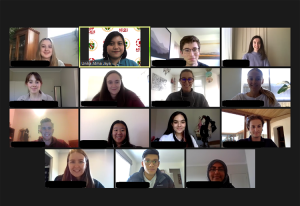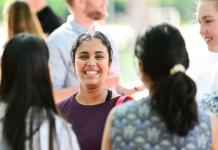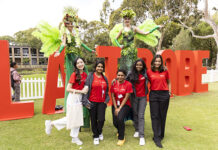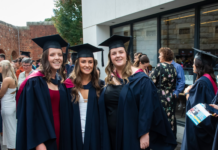Tiana Iskra is a final year Bachelor of Laws and Bachelor of Psychological Science student who has participated in three in-country short programs and one virtual program through La Trobe Abroad, so we asked Tiana the question, which one is better?
Let’s start with what programs you have participated in?
I previously participated in three in-country programs: As a Group Leader at the 2-week University Scholars Leadership Symposium (USLS) at the United Nations in Thailand, La Trobe University’s 2-week Chinese Law winter school subject at Shanghai University and the 2-week Reimagining India program with IndoGenius. Then, over the summer break in 2021, I participated in the ACICIS Virtual Law Professional Practicum.



Tell us about your three in-country programs?
In August 2018 I attended the USLS at the United Nations in Bangkok which brought together 1057 delegates from 87 countries to collaborate and discuss how young leaders can drive sustainable, tangible change locally and internationally. As a Group Leader, I participated in an additional 2-day leadership training course and collaborated with international delegates to facilitate an activity day for approximately 100 school students. In between the conference, I explored Bangkok, the food, the sights, and the incredible culture of Thailand.
In November 2018, I studied the Introduction to Chinese Law subject at Shanghai University, a 2-week crash course in Chinese Law. We participated in daily seminars, each on a different area of Chinese Law. We also spent time at the University and went on field excursions to different legal institutions. The subject expanded the scope of my university experience and provided an international perspective to my law degree. In our spare time, we sampled the delicious cuisine, explored the city and visited Shanghai Disneyland. After the program, I travelled solo to Beijing and met up with my friend Peter King to see the Great Wall of China. China is a beautiful country and I look forward to going back in the future.
In February 2020, I joined IndoGenius co-founder, Nick Booker as he led the Reimagining India Program and shared his extensive knowledge about India; an incredible country with a rich history and culture and fast becoming a world-leader in the technology sector. The program took us to technology companies and start-ups such as Infosys, Google India, Zomato, JCB and PayTM. We visited Delhi, Jaipur, Agra, and Mumbai along with cultural and religious sites, including numerous temples, the Taj Mahal, Humayun’s Tomb, and the Gateway of India.



Tell us what it’s like to complete a virtual Practicum?
The experience was fantastic, albeit with the challenges of interacting with an international organization in a virtual setting. I was able to develop my international legal literacy, strengthen my cultural understanding of Indonesia and develop rapport with the staff over Zoom.
ACICIS placed us at a host organization and as part of my internship at the Center for Human Rights (PUSHAM UII) located at the Islamic University of Indonesia, I choose a research project on ‘the barriers faced by people with disabilities in Indonesia’s legal system and how Indonesia can overcome these barriers’. The research project opened my eyes to the grassroots legal projects currently being conducted in Indonesia. PUSHAM UII is an example of an organisation that is creating tangible, systemic change through education. I strongly believe that this message is at the heart of being able to make the world a better place.
The most rewarding part of the virtual program was engaging with Indonesia’s legal system on a multi-dimensional level during the global pandemic. I thoroughly enjoyed developing working relationships in a virtual setting and engaging with the staff and students from various parts of Australia and Indonesia. These skills will help me with future engagement with Indonesia, both in-person and online.

Did you receive funding for all these programs?
Yes, I received funding for every program and it really helped. Both the ACICIS Virtual Law Professional Practicum and the IndoGenius Reimagining India Program were funded by $3,000 New Colombo Plan Mobility Grants, La Trobe Abroad provided $500 Mobility Grants for both the USLS and Introduction to Chinese Law programs and I took out a $7,998 OS-HELP loan from the Australian Government to help cover the costs to travel to China. I recommend you research funding opportunities, as there are many, from both La Trobe Abroad and the Australian Government.



Ok, now for the big question: In-country vs virtual programs, what’s better?
Having completed three in-country programs and one virtual program, I would say that both options provide unparalleled opportunities to expand the scope of a university degree (or two).
In-country programs allows students to experience and gain a deeper understanding of a country’s culture, food and historical sites. Some of the highlights of my in-country programs have been the sightseeing and friendships that I developed after the day’s program had been completed.
However, the virtual program provides an entirely new perspective from the comfort of your own home. Virtual programs eliminate the need to travel internationally to engage with an international university or internship. If students are considering applying for Australian-based internships or study programs because they cannot travel overseas, they may as well expand their horizons and engage in virtual international programs.
To see what your options are to study virtually now or see examples of past programs that might be available again in the future, visit La Trobe Abroad’s Overseas Short Programs page.















